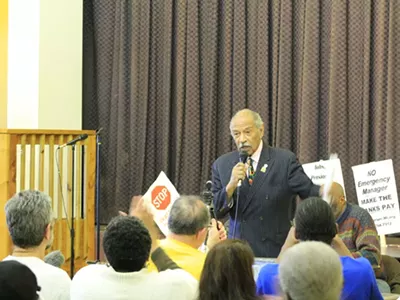David Roehrig was born in Salt Lake City, but has lived in the Detroit area since age 2, when his mom brought him back to her hometown. The 30-year-old says he’s bounced between the city and the east side suburbs since then, and has spent the last six or seven years in Hamtramck and Detroit. He’s a city of Detroit employee who enjoys talking about politics.
MT: For people moving into Detroit, especially white, relatively high-earning people, what’s the best mentality to cultivate and to avoid?
David Roehrig: I think the best mentality is to be humble. I think when you’re going into a neighborhood that’s not reflective of who you are, whether that’s because of race or income, I think you should make sure that when you go into a community you’re respectful of what is already there. I think the worst thing that people can do is to come to Detroit with the idea that they are going to “build community,” because, whether they know it or not, that occasionally means to build a community that they want in replacement of what is already there. And I don’t think people necessarily mean it that way, but that’s what ends up happening.
MT: Just to play devil’s advocate, why do people have to acknowledge what’s already there. What are the practical benefits of doing that?
Roehrig: You have to adapt yourself to the culture that’s already there. I think it’s a measure of respect, especially if they’ve been there much longer than you have, have much more experience in that neighborhood. To walk into a neighborhood already kind of having your own agenda or seeking to alter the neighborhood to benefit you, you’re going to have people viewing you as an interloper or an outsider, suburbanite, cracker, bougie, whatever. That’s not the way to have a neighborhood function well. And you don’t even need an agenda. A lot of people come to Detroit because there isn’t much infrastructure, taking advantage of the fact that it can be a playground where they can do what they want because there isn’t anybody really checking up on whether the grass is mowed or whether they’ve put up some crazy artistic sculpture in the middle of their lawn. And sometimes that’s fine. But there are people where I live who are mostly Bengali, and don’t drink let alone smoke pot. And some of the newer residents do it pretty openly, and they’ve got crazy art stuff all over their house and … these people aren’t even the worst when it comes to having that mentality of thinking they’re going to remake the neighborhood, but …
MT: … but you wouldn’t do it in Ferndale.
Roehrig: Yeah, it’s treated as a playground. If you have problems — if you have a mental illness, if you are homeless, if you have a drug problem, if you just want to screw around and party and run through red lights and do crazy stuff — you can come to Detroit. … And I think a lot of times people come into the city and they’re not always even aware of the fact that they’re looked at as crazy or disrespectful. A lot of people say, “Hey, there’s a bunch of abandoned houses, and I see bums and homeless people so, therefore, anything I do must be an improvement.” And it’s not always the case. There’s a hippie development over there off State Fair, and a lot of the residents don’t want violence or crime, but they also don’t want hippies running around half-naked at 4 in the morning partying. That’s not an improvement. That’s just more crap that they gotta deal with. You know, these people have kids and, if they’re lucky enough, a job, and they gotta go to bed and …
MT: … and they don’t want to live next to a frat house.
Roehrig: Yeah, whether that frat house is a jock or thug frat house or the hippie or freak frat house. They just want neighbors who are respectful, who fix their houses as best they can and not cause problems. And I think that’s an expectation they should have.
MT: So don’t be a disrespectful “colonist.”
Roehrig: Right. But, in a way, the “colonists” are getting hurt by it just as much. They get sold this idea that, hey, Detroit is the “creative commons,” and you can come down here and have a little and a space of your own. And what happens, a lot of the time, is that you get your house broken into or your laptop stolen from your car and … people are looking at you as a resource. You have money, and you’re sitting among a bunch of poor people, you end up being a big, giant walking dollar sign. And you don’t even have to be wealthy, you could just have a steady job, and all of a sudden you’re going to be very different from a lot of the members of neighborhoods who don’t have work. You’ve got to be careful. It’s a situation in which everybody’s kind of pitted against each other to survive, and if you walk in thinking you’re going to be a “white superhero,” you’re probably going to get eaten alive. And you’re probably going to leave.
MT: Any advice for longtime Detroiters on how to handle newcomers?
Roehrig: Be careful. Don’t automatically write someone off, but hold them to being respectful to the neighborhood, and, if they’re not, don’t make it a personal issue — make it a neighborhood issue.







